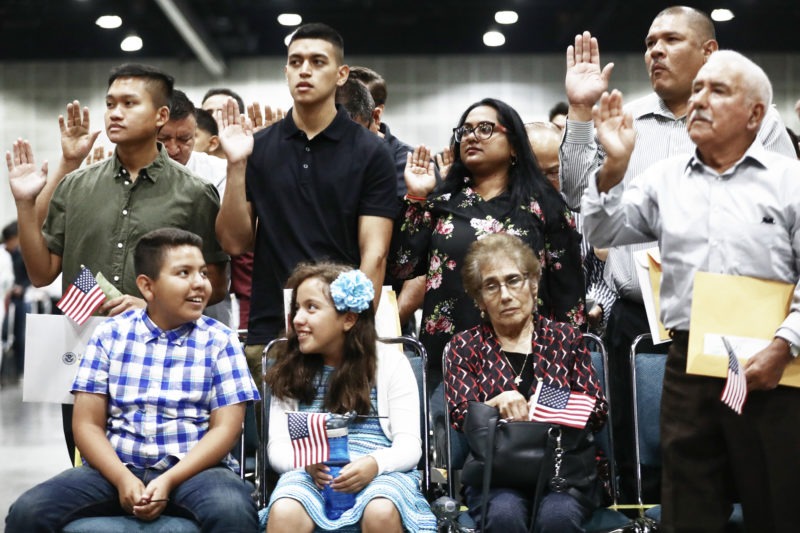US to deny citizenship to immigrants who use public benefits
New US citizens are sworn in at a naturalization ceremony at the Los Angeles Convention Center on July 23, 2019 in Los Angeles, California (MARIO TAMA)
Washington (AFP) – The administration of US President Donald Trump announced Monday new rules that aim to deny permanent residency and citizenship to migrants who receive food stamps, public health care and other welfare.
The new rules threatened to set back the citizenship hopes of millions of mostly Hispanic migrants who work for low wages and depend in part on public services to get by.
Announcing a new definition of the longstanding “public charge” law, the White House said the 22 million non-citizen residents of the United States who are using public services will not be able to obtain green cards or US citizenship.
In addition, hopeful migrants will not be granted resident visas if they are deemed too poor and likely to need public assistance.
“To protect benefits for American citizens, immigrants must be financially self-sufficient,” Trump said in a White House statement.
The move expands the Trump administration’s broad assault on immigration.
The government has already tried to crack down on illegal border crossers. It has also stepped up arrests and deportations of the estimated 10.5 million undocumented migrants who live in the country, two-thirds of whom have been present for more than 10 years.
Both groups are largely ethnically Hispanic.
– Vows of lawsuits –
The newest move seeks to limit the path to citizenship for millions in the United States legally, tying their future hopes to not using public assistance programs.
Pro-migrant activists announced they would file lawsuits to block the rules, and Democrats in Congress said they would fight what some called a “racially motivated policy.”
“This administration scapegoats immigrants, emboldens white supremacists, and tears families apart. This is racist policy. We will continue fighting to #ProtectFamilies,” tweeted Representative Donna Shalala.
Marielena Hincapie, executive director of the National Immigration Law Center, called the moves “a cruel new step toward weaponizing programs that are intended to help people” and announced plans to sue.
“It will have a dire humanitarian impact, forcing some families to forego critical life-saving health care and nutrition. The damage will be felt for decades to come,” she said.
In justifying the rules, the White House said that “large numbers” of migrants “have taken advantage of our generous public benefits, limited resources that could otherwise go to vulnerable Americans.”
It said that half of all non-citizen households include at least one person using the government-run health program Medicaid, and that 78 percent of households led by a non-citizen with no more than a high school education use at least one welfare program.
“Through the public charge rule, President Trump’s administration is reinforcing the ideals of self-sufficiency and personal responsibility, ensuring that immigrants are able to support themselves and become successful here in America,” said Ken Cuccinelli, acting Director of US Citizenship and Immigration Services.
– Planned since 2018 –
The new standards would apply to non-citizen residents who use public services repeatedly after October 15, 2019.
The services that count against an applicant include federal, state and local cash and income assistance, food stamps from the federal SNAP program, Medicaid, and subsidized housing.
Cuccinelli stressed that the new rules did not apply to public assistance programs for children or pregnant women, or emergency room care.
The changes to the “public charge” rules and the US immigration system generally have been in the works since 2018, as part of Trump’s campaign to slash both legal and illegal immigration.
In May, Trump announced a broad plan for immigration “that protects American wages, promotes American values, and attracts the best and brightest from all around the world.”
“As a result of our broken rules, the annual green card flow is mostly low-wage and low-skilled,” he said.
“We’re not able to give preference to a doctor, a researcher, a student who graduated number one in his class from the finest colleges in the world — anybody.”
– Immigrants foregoing healthcare –
Pro-immigration groups said the use of public services by immigrants is exaggerated and not detrimental.
In a study last month, the Urban Institute said the new regulations, when first proposed publicly last year, drove immigrant families to preemptively curtail their use of public services.
Some were pulling out of the SNAP program, leaving them with “insufficient resources for food and adequate nutrition.”
In addition, staying away from Medicaid “put people in a position of forgoing treatment for chronic conditions and preventive medical care,” the institute wrote.
Disclaimer: Validity of the above story is for 7 Days from original date of publishing. Source: AFP.


